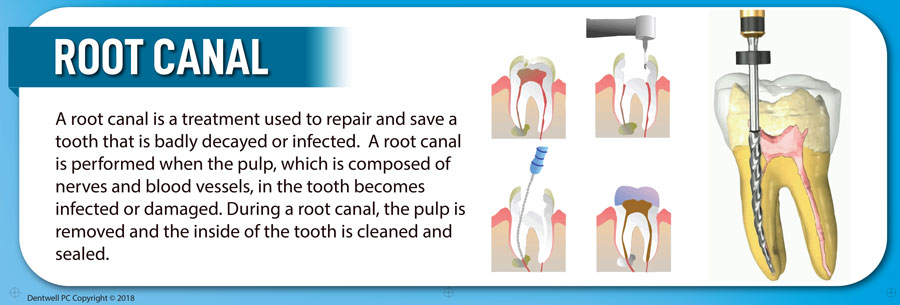If you have a cavity or tooth infection, a root canal procedure is typically the most efficient treatment. We’ll restore your natural tooth in one quick step. Our doctor is an expert at root canal treatment in our pleasant East El Paso, TX dental practice.
A root canal procedure is often the most cost-effective and best way to restore your tooth back to normal function while still looking beautiful thanks to cutting-edge techniques and sophisticated materials. But, exactly what is root canal therapy and how can you get the most out of it? This article will explain what a root canal is and whether it’s the right solution for your unique dental health care needs.

What is Root Canal Treatment?
When your teeth’s pulp and roots are afflicted, prompt treatment is required to preserve the teeth. The diseased and decaying portion of the tooth is removed during endodontic therapy, also known as root canal treatment. With careful and effective endodontic therapy, you may prevent abscesses or tooth extraction while obtaining the advantages of an esthetic outcome.
There are millions of people who have root canals done every year, so there is no need to be concerned or afraid if you are advised to get this treatment by our dentist. This implies alleviating any pain and preserving your natural teeth.
The Root Canal Procedure
Root canal therapy can sometimes involve one or more dental visits. Our dentist will perform the following necessary steps to save your original tooth:
- The numbing of the tooth with a topical anesthetic will begin the procedure. A rubber dam, which is a thin, stretchy membrane, will be placed over your tooth to keep it dry. Then, using the crown of your tooth as a guide, an opening is drilled through the top of the crown into the pulp chamber.
- The nerve and pulp of a tooth are then removed from the pulp chamber and root canal to prevent further disease. In preparation for receiving a tooth filling, the root canal is thoroughly cleaned, shaped, and disinfected.
- Your dentist will also fill the pulp chamber and root canal with medication to treat and prevent any additional infections.
- After the root canal is sealed, a filling material is used to seal the tooth for a short period of time. If the infestation has advanced beyond the end of the root and into the surrounding tissue, antibiotics may be given to prevent an abscess from forming.
- Finally, after filling the tooth and restoring its function and appearance, the doctor will remove the temporary restoration and restore the tooth with a permanent crown or a filling to strengthen and preserve the function and appearance.
What Are the Benefits of Endodontic Therapy for Natural Teeth?
Through root canal treatment, a tooth can be saved and restored. If the diseased pulp is not treated, the tissues surrounding the tooth’s root may become infected, causing discomfort, swelling, and in some cases affecting neighboring teeth. Bacteria can also damage the bone that supports the tooth in the jaw, even if you are not experiencing pain. As a result, without therapy, the tooth will have to be extracted eventually.
Benefits of Root Canal Therapy
There are a variety of reasons to maintain your natural smile, continue tooth function, and avoid future costly dental work after completing root canal therapy. A root canal will last a lifetime if properly cared for and kept clean.
Pain-Free Procedure
A root canal procedure is considerably less painful than a tooth extraction, and you’ll suffer less discomfort after the procedure. Patients who have had a root canal are six times more likely to describe it as “painless” than patients who have had a tooth removed with today’s technology and anesthesia.
Efficient & Cost-Effective
Because of subsequent dental visits necessary for a denture, bridge, crown, or dental implant, tooth extraction might take longer than a root canal. Endodontic therapy is a good investment. Most dental insurance plans cover endodontic treatment as a bonus. So, be sure to inquire with our specialists if your insurance will reimburse you for root canal surgery.
Will a Root Canal Work for Me?
If you have a tooth infection and require root canal treatment, this might be the ideal option for you. The most typical symptom of dental infection is pain exacerbated by pressure or temperature change. Gum abscesses, internal discoloration of tooth enamel, and chronic bad breath are other frequent signs of oral infection. A cracked tooth might need a root canal treatment as well.
It’s vital to note that an internal dental infection can grow without showing signs, making regular dental checkups and cleanings crucial for your oral health. The dentist will examine you and take x-rays to assess the severity of your dental injuries. He can then determine if root canal therapy is a good fit for you.
Schedule a Root Canal Consultation Today!
Schedule your next dental exam and root canal consultation today by calling us at (915) 263-8333, or click on the Appointments button above to book an appointment. Our dental team is highly knowledgeable and can answer any other questions about root canal therapy you may have.